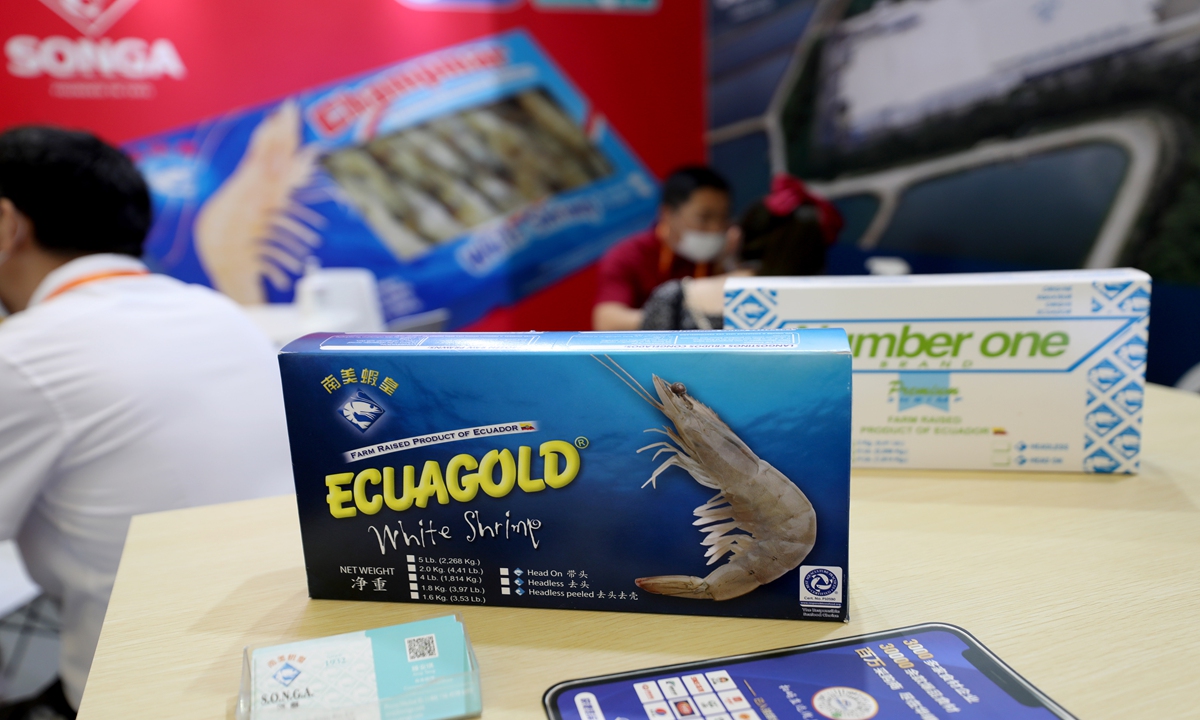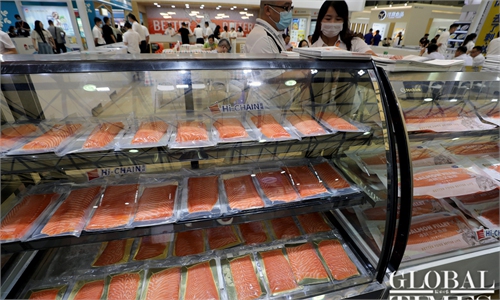SOURCE / INDUSTRIES
Seafood exporters still confident in outlook for Chinese consumption
Seafood exporters confident in China's outlook

An Ecuadorian seafood exporter and shrimp producer displays a box of Ecuadorian shrimp at World Seafood Shanghai 2020, a trade event, on Wednesday. Photo: Yang Hui/GT
Despite the impact of the coronavirus outbreak and a fishery dispute, foreign participants in the seafood sector are still optimistic about the prospects for trade and cooperation with China.
Victoria Braathen, director for the Chinese mainland and Hong Kong at the Norwegian Seafood Council, told the Global Times on Wednesday that the Norwegian seafood industry looks forward to developing the Chinese market, where it sees great potential.
"The Norwegian seafood industry has been looking at the China market for more than 20 years...it is a market where we see great potential, and we are confident that we will see growing trade and growing demand (in China)," she said.
She said that the incident in the [Beijing Xinfadi] market had affected Norway's salmon sales to China, but she already sensed a gradual recovery in salmon demand in China, and believed the trend will continue.
China's seafood consumption has been rising year after year, matching increased import levels and higher incomes. Per capita seafood consumption in China is expected to reach 35.9 kilograms this year, while urban consumption has already exceeded 40 kilograms, according to World Sea-food Shanghai.
Reg Tang, chairman of Shanghai-based Gfresh, a website specializing in imported seafood including salmon and Ecuadorian white shrimp, said that although salmon and some other segments of the seafood industry have been hit hard by the coronavirus, with demand shrinking and prices slumping, demand will likely recover or even surge in about one year.
Despite a seemingly low ebb in the industry, his company is already making business arrange-ments currently such as signing contracts with some overseas suppliers, in order to prepare for the anticipated consumption recovery,
China and Ecuador signed a protocol on August 12 to facilitate the export of white shrimp, after several shipments from Ecuadorean suppliers to China were suspended due to the coronavirus, according to the Ecuadorean Ministry of Production, Foreign Trade, Investments and Fisheries.
Chinese seafood imports are expected to exceed $20 billion this year. Domestic overfishing and environmental concerns are pointing toward greater demand for imported seafood, said World Seafood Shanghai.
Tang attributed some fishery conflicts with overseas countries to China's shortage of seafood re-sources. He suggested that Chinese companies try alternative methods of fishery cooperation overseas, such as buying shares in overseas marine companies or making other types of overseas investment.
China's fishery authority has decided to ban fishing in the high seas west of the Galapagos Islands Marine Reserve from September to November this year, a move that is appreciated by Ecuador and other relevant countries, said a spokesperson of the Ministry of Foreign Affairs on August 6, adding that relevant authorities of China and Ecuador have held a videoconference on the matter.




